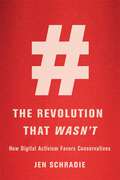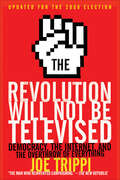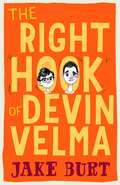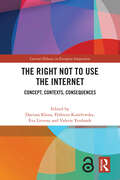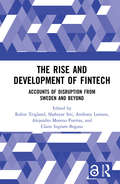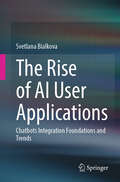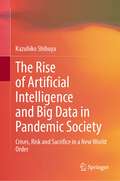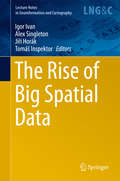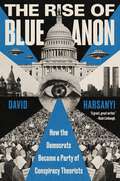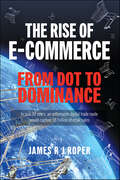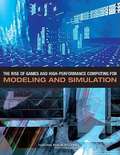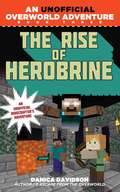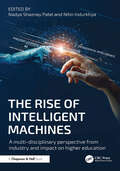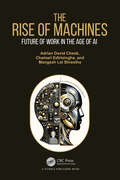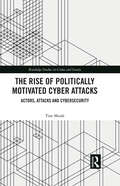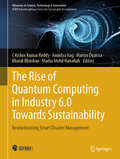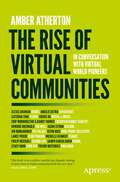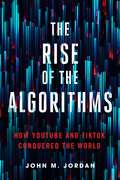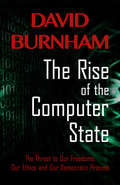- Table View
- List View
The Revealers
by Doug WilhelmThrowing light on a dark problem: Parkland Middle School is a place the students call Darkland, because no one in it does much to stop the daily harassment of kids by other kids. <P><P>Three bullied seventh graders use their smarts to get the better of their tormentors by starting an unofficial e-mail forum at school in which they publicize their experiences. <P>Unexpectedly, lots of other kids come forward to confess their similar troubles, and it becomes clear that the problem at their school is bigger than anyone knew. <P>The school principal wants to clamp down on the operation, which she does when the trio, in their zealousness for revenge, libel a fellow student in what turns out to have been a setup. <P>Now a new plan of attack is needed ... <P>This suspenseful story of computer-era underground rebellion offers fresh perspectives on some of the most enduring themes in fiction for young readers.
The Revolution That Wasn’t: How Digital Activism Favors Conservatives
by Jen SchradieIn this counterintuitive study of digital democracy, Jen Schradie shows how the web has become another weapon in the arsenal of the powerful, and a potent weapon for conservative activists. Rather than leveling the playing field, the internet has tilted it in favor of the Right, where only the most sophisticated and well-funded players can compete.
The Revolution Will Not Be Televised: Democracy, the Internet, and the Overthrow of Everything
by Joe TrippiIn a blend of Wired magazine and The Boys on the Bus, the man who invented Internet politics tells the story of how it was done and reveals how every sector can benefit from tech revolution.Campaign manager Joe Trippi, who signed on to run Howard Dean’s campaign when there was less than $100,000 in the till and fewer than 500 people involved, transformed the most obsure candidate in the field into the Democratic frontrunner and all-but-coronated party nominee in less than a year. The secret of Trippi’s off-the-charts success: a revolutionary use of the Internet, and an impassioned, contagious desire to overthrow politics-as-usual. Before Dean knew it, he had a groundswell of 600,000 Americans behind him, was leading in every poll, and had raised $45 million—more money than any Democrat in history. We now know that unprecedented fundraising, unheard-of numbers of people checking in on the Internet, chatting on blogs, reaching out to their fellow voters and showing up at house parties really can compete with—and in so many ways exceed— the more traditional approaches to winning in politics. But the why’s and how’s leave much fertile ground to plow, and for the first time, Trippi, an icon to all the Dean supporters he energized, is sharing his lessons learned, along with colorful behind-the-scenes stories from the campaign trail. Perhaps lulled by the bust of the dot.com boom, many have dismissed the Internet as old news. But if Dean’s campaign wasn’t enough of a wake-up call, this book is: Trippi reveals just how the sleeping power of technology can be harnessed, and illuminates how every organization and individual in America can benefit from the tidal wave of change on the horizon.
The Rhetoric of Videogames as Embodied Practice: Procedural Habits (Routledge Studies in Rhetoric and Communication)
by Steve HolmesThe Rhetoric of Videogames as Embodied Practice offers a critical reassessment of embodiment and materiality in rhetorical considerations of videogames. Holmes argues that rhetorical and philosophical conceptions of "habit" offer a critical resource for describing the interplay between thinking (writing and rhetoric) and embodiment. The book demonstrates how Aristotle's understanding of character (ethos), habit (hexis), and nature (phusis) can productively connect rhetoric to what Holmes calls "procedural habits": the ways in which rhetoric emerges from its interactions with the dynamic accumulation of conscious and nonconscious embodied experiences that consequently give rise to meaning, procedural subjectivity, control, and communicative agency both in digital game design discourse and the activity of play.
The Right Hook of Devin Velma
by Jake BurtFrom the author of Greetings from Witness Protection! comes another unforgettable middle-grade novel about friendship and family.Devin wants to hit it big on the internet by pulling a stunt at an NBA game—one the entire nation will be watching. Addison can’t turn Devin down, but he can barely manage talking to his teachers without freezing up. How’s he supposed to handle the possibility of being a viral sensation?Addi’s not sure why Devin is bent on pulling off this almost-impossible feat. Maybe it has something to do with Devin’s dad’s hospital bills. Maybe it all goes back to the Double-Barreled Monkey Bar Backflip of Doom. Or maybe it’s something else entirely. No matter what, though, it’s risky for both of them, and when the big day finally comes, Devin’s plan threatens more than just their friendship.With memorable protagonists and a wonderful supporting cast, The Right Hook of Devin Velma is a one-of-kind knockout in middle-grade fiction.
The Right Not to Use the Internet: Concept, Contexts, Consequences (Current Debates in European Integration)
by Dariusz Kloza Eva Lievens Elżbieta Kużelewska Valerie VerdoodtThis pioneering collection addresses the prospective fundamental/human right not to use the Internet and the challenges that the non- use of the Internet poses for democracy.As the Internet has increasingly ceased to be a mere option and rather turned into a de facto obligation for anyone who exercises their rights or fulfils duties, these developments bring about profound ramifications for the very existence and the functioning of democracy, and therefore merit a critical reflection. With contributors from academia and legal practice from all over Europe, this edited volume offers timely critical analysis of the right not to use of the Internet, at times supplemented with policy advice and postulates for law reform.This book is of key interest to scholars and students of – predominantly – law, political science and philosophy as well as to policymakers, judges and nongovernmental organisations at national, supranational and international levels.The Open Access version of this book, available at www.taylorfrancis.com, has been made available under a Creative Commons Attribution-Non Commercial-No Derivatives (CC-BY-NC-ND) 4.0 license.
The Right To Be Forgotten: A Comparative Study of the Emergent Right's Evolution and Application in Europe, the Americas, and Asia (Ius Comparatum - Global Studies in Comparative Law #40)
by Franz WerroThis book examines the right to be forgotten and finds that this right enjoys recognition mostly in jurisdictions where privacy interests impose limits on freedom of expression. According to its traditional understanding, this right gives individuals the possibility to preclude the media from revealing personal facts that are no longer newsworthy, at least where no other interest prevails. Cases sanctioning this understanding still abound in a number of countries. In today’s world, however, the right to be forgotten has evolved, and it appears in a more multi-faceted way. It can involve for instance also the right to access, control and even erase personal data. Of course, these prerogatives depend on various factors and competing interests, of both private and public nature, which again require careful balancing. Due to ongoing technological evolution, it is likely that the right to be forgotten in some of its new manifestations will become increasingly relevant in our societies.
The Right to Data Protection: Individual and Structural Dimensions of Data Protection in EU Law (Information Technology and Law Series #34)
by Felix BiekerThis book advances an approach that combines the individual and the structural, systemic dimensions of data protection. It considers the right to data protection under the EU Charter and its relationship to the secondary legislation. Furthermore, the case law of the Court of Justice of the EU as well as current academic conceptualizations are analysed. The author finds that current approaches invariably link data protection to privacy and often fail to address the structural implications of data processing. He therefore suggests a dualistic approach to data protection: in its individual dimension, data protection aims to protect natural persons and their rights, while the structural dimension protects the democratic society as a whole from the adverse effects of data processing. Using this approach, the full potential of an independent right to data protection can be realized. Researchers, practitioners and students will find this a valuable resource on the rationales, scope and application of data protection. Felix Bieker is Legal Researcher at the Office of the Data Protection Commissioner of Schleswig-Holstein (Unabhängiges Landeszentrum für Datenschutz) in Kiel, Germany.
The Right to Privacy 1914–1948: The Lost Years (SpringerBriefs in Law)
by Megan RichardsonThe book offers a provocative review of thinking about privacy and identity in the years encompassing and disrupted by the two world wars of the first half of the twentieth century – focusing (in particular) on the socio-technological transformations associated with modernism. It argues that, with many of the most interesting modern thinkers of the period dead or marginalised (or both) by 1948, their ideas about how rights such as privacy should develop to accommodate the exigencies of modern life failed to find much of a voice in the drafting of the Universal Declaration of Human Rights. Yet they anticipated in surprising ways some of our ‘new’ ways of thinking in more recent times. After a brief introduction, the chapters are framed in terms of case studies on the right to privacy, the right to data protection and the right to be forgotten, each finishing with a consideration of how these rights require further rethinking in the digital century.
The Rise and Development of FinTech: Accounts of Disruption from Sweden and Beyond (Routledge International Studies in Money and Banking)
by Robin Teigland Shahryar Siri Anthony Larsson Alejandro Moreno Puertas Claire Ingram BoguszThis comprehensive guide serves to illuminate the rise and development of FinTech in Sweden, with the Internet as the key underlying driver. The multiple case studies examine topics such as: the adoption of online banking in Sweden; the identification and classification of different FinTech categories; process innovation developments within the traditional banking industry; and the Venture Capital (VC) landscape in Sweden, as shown through interviews with VC representatives, mainly from Sweden but also from the US and Germany, as well as offering insight into the companies that are currently operating in the FinTech arena in Sweden. The authors address questions such as: How will the regulatory landscape shape the future of FinTech companies? What are the factors that will likely drive the adoption of FinTech services in the future? What is the future role of banks in the context of FinTech and digitalization? What are the policies and government initiatives that aim to support the FinTech ecosystem in Sweden? Complex concepts and ideas are rendered in an easily digestible yet thought-provoking way. The book was initiated by the IIS (the Internet Foundation in Sweden), an independent organization promoting the positive development of the Internet in the country. It is also responsible for the Internet’s Swedish top-level domain .se, including the registration of domain names, and the administration and technical maintenance of the national domain name registry. The book illustrates how Sweden acts (or does not act) as a competitive player in the global FinTech arena, and is a vital addition to students and practitioners in the field.
The Rise of AI User Applications: Chatbots Integration Foundations and Trends
by Svetlana BialkovaThis monograph introduces readers to core theories and applications in the chatbot AI context. Although AI is attracting significant attention, there is a literature gap and lack of practical guidelines on the key drivers of chatbot efficiency and agency capacity. There is a caveat between algorithmic explanations and actionable understanding, despite the acknowledged importance of inherently human-centric properties. Addressing these gaps, this state-of-the-art book offers a distinctive combination of content, theory, practice evaluation, and a holistic framework encompassing cognitive, emotional and social aspects, focusing on how to enhance AI agency and user experience. The framework aims to drive design, encouraging development of intelligent systems, techniques to evaluate chatbot with purposes, to appropriately meet user needs and market demand for responsible and explainable AI, XAI. Avenues for transforming business and life by implementing new generation AI systems are further discussed, as well as recommendations to overcome consumer resistance and advice for policy measures to reduce risks given the AI boost. While the community is still in an exploratory mode, we hope “The Rise of AI User Applications: Chatbots Integration Foundations and Trends” provides the needed understanding and will inspire researchers across disciplines to combine their efforts and work together on this very intriguing topic.
The Rise of Artificial Intelligence and Big Data in Pandemic Society: Crises, Risk and Sacrifice in a New World Order
by Kazuhiko ShibuyaThis book presents a study of the COVID-19 pandemic using computational social scientific analysis that draws from, and employs, statistics and simulations. Combining approaches in crisis management, risk assessment and mathematical modelling, the work also draws from the philosophy of sacrifice and futurology. It makes an original contribution to the important issue of the stability of society by highlighting two significant factors: the COVID-19 crisis as a catalyst for change and the rise of AI and Big Data in managing society. It also emphasizes the nature and importance of sacrifices and the role of politics in the distribution of sacrifices. The book considers the treatment of AI and Big Data and their use to both “good” and “bad” ends, exposing the inevitability of these tools being used. Relevant to both policymakers and social scientists interested in the influence of AI and Big Data on the structure of society, the book re-evaluates the ways we think of lifestyles, economic systems and the balance of power in tandem with digital transformation.
The Rise of Big Spatial Data
by Alex Singleton Igor Ivan Jiří Horák Tomáš InspektorThis edited volume gathers the proceedings of the Symposium GIS Ostrava 2016, the Rise of Big Spatial Data, held at the Technical University of Ostrava, Czech Republic, March 16-18, 2016. Combining theoretical papers and applications by authors from around the globe, it summarises the latest research findings in the area of big spatial data and key problems related to its utilisation. Welcome to dawn of the big data era: though it's in sight, it isn't quite here yet. Big spatial data is characterised by three main features: volume beyond the limit of usual geo-processing, velocity higher than that available using conventional processes, and variety, combining more diverse geodata sources than usual. The popular term denotes a situation in which one or more of these key properties reaches a point at which traditional methods for geodata collection, storage, processing, control, analysis, modelling, validation and visualisation fail to provide effective solutions. >Entering the era of big spatial data calls for finding solutions that address all "small data" issues that soon create "big data" troubles. Resilience for big spatial data means solving the heterogeneity of spatial data sources (in topics, purpose, completeness, guarantee, licensing, coverage etc. ), large volumes (from gigabytes to terabytes and more), undue complexity of geo-applications and systems (i. e. combination of standalone applications with web services, mobile platforms and sensor networks), neglected automation of geodata preparation (i. e. harmonisation, fusion), insufficient control of geodata collection and distribution processes (i. e. scarcity and poor quality of metadata and metadata systems), limited analytical tool capacity (i. e. domination of traditional causal-driven analysis), low visual system performance, inefficient knowledge-discovery techniques (for transformation of vast amounts of information into tiny and essential outputs) and much more. These trends are accelerating as sensors become more ubiquitous around the world.
The Rise of BlueAnon: How the Democrats Became a Party of Conspiracy Theorists
by David HarsanyiDavid Harsanyi delves into the mindset of people who think Republicans would usher in the Handmaid's Tale and who compare Trump's Madison Square Garden rally to a pro-Nazi rally held there eight decades earlier. In The Rise of BlueAnon, David Harsanyi reveals how the left has been consumed by a uniquely dangerous and delusional brand of conspiracy theories. And unlike those on the right, the Left’s conspiracy theories are rarely kept in check by mainstream institutions. How many Democrats are donning tinfoil hats? Way more than the media will admit:· A recent poll found nearly twice as many Democrats as Republicans believed “the Holocaust is a myth.” · Historically, Democrats are more likely to be 9/11 “Truthers." · Democrats have been accusing Republicans of stealing elections since Reagan defeated Carter.· Despite their lawn signs declaring, “science is real,” Democrats are twice as likely to believe in astrology as Republicans. · Most of the Americans who believe that alien spacecraft are observing our planet right now are Democrats. · Democrats have spread the most successful conspiracy theory in American history: The Trump-Russia collusion hoax. From shrieks that we’re just one election away from living in The Handmaid’s Tale, to shrills that the world will end in 12 years from a corporation-caused climate catastrophe, Democrats have whipped themselves up with unfounded fears and falsehoods.Virtually all mainstream media experts, pundits, and late-night talk-show hosts claim that conservatives are a bunch of unhinged conspiracy theorists. The Rise of BlueAnon is a fun, hard-hitting, and insightful refutation of this myth, and it shows why so many Democrat accusations are, in reality, projections.
The Rise of E-Commerce: From Dot to Dominance
by James RoperThe amazing and authoritative story of e-commerce: its origins, evolution and astonishing ascendence. The amazing and authoritative story of e-retail: its origins, evolution and astonishing ascendance. Meet the pioneers and businesses that explored the possibilities of the emerging virtual world, review the technology innovations that paved the way, and journey the rocky road to domination for the online shopping industry. As the founder of the UK’s industry association for e-commerce (IMRG), author James Roper was there from its inception… ‘An important and well-timed book about how the humdrum business of shopping was reinvented online. James Roper is a persuasive advocate for the role of collaboration in innovation, who was instrumental in jumpstarting the e- retail industry by methodically tackling every obstacle that blocked its early progress… In this book, Roper offers a fascinating glimpse at how a motley assemblage of inventions evolved, often in surprising ways, into today’s staggeringly powerful e-retail industry. Stuffed with eye-opening facts and statistics The Rise of e-Commerce is an essential read for anyone who is interested in the evolution of modern retailing.’ Nick Robertson, Co-founder and Ex-CEO, ASOS
The Rise of Games and High-Performance Computing for Modeling and Simulation
by National Research Council of the National AcademiesThe technical and cultural boundaries between modeling, simulation, and games are increasingly blurring, providing broader access to capabilities in modeling and simulation and further credibility to game-based applications. The purpose of this study is to provide a technical assessment of Modeling, Simulation, and Games (MS&G) research and development worldwide and to identify future applications of this technology and its potential impacts on government and society. Further, this study identifies feasible applications of gaming and simulation for military systems; associated vulnerabilities of, risks to, and impacts on critical defense capabilities; and other significant indicators and warnings that can help prevent or mitigate surprises related to technology applications by those with hostile intent. Finally, this book recommends priorities for future action by appropriate departments of the intelligence community, the Department of Defense research community, and other government entities. The Rise of Games and High Performance Computing for Modeling and Simulation will serve as a useful tutorial and reference document for this particular era in the evolution of MS&G. The book also highlights a number of rising capabilities facilitated by MS&G to watch for in the coming years.
The Rise of Herobrine: An Unofficial Overworld Adventure, Book Three (Unofficial Overworld Adventure)
by Danica DavidsonStevie has been having repeated nightmares about the mysterious figure known as "Herobrine.” Some say Herobrine is an old ghost story. Some say he’s a virus. But no one believes he is real...except maybe Stevie, whose nightmares are telling him that Herobrine is going to take over the Overworld.His cousin Alex has come to visit, and during one of her explorations, she finds a music disc that predicts the destruction of the Overworld! Are Stevie’s nightmares and the music disc connected? Stevie and Alex hook up with Stevie’s best friend Maison, and the three quickly begin looking for answers.While they look, Herobrine is drawing ever closer. Someone is stealing the villagers’ most precious belongings, including Stevie’s cat, Ossie. People are angry and turning against one another. And there are mysterious signs appearing around the Overworld.Stevie, Maison, and Alex must unearth more music discs, piece together clues from the nightmares, and, ultimately, confront Herobrine-the most feared being of all-at his dark home in an abandoned temple high atop a forbidding mountain. The fate of the Overworld is depending on them.Sky Pony Press, with our Good Books, Racehorse and Arcade imprints, is proud to publish a broad range of books for young readers-picture books for small children, chapter books, books for middle grade readers, and novels for young adults. Our list includes bestsellers for children who love to play Minecraft; stories told with LEGO bricks; books that teach lessons about tolerance, patience, and the environment, and much more. In particular, this adventure series is created especially for readers who love the fight of good vs. evil, magical academies like Hogwarts in the Harry Potter saga, and games like Minecraft, Terraria, and Pokemon GO. While not every title we publish becomes a New York Times bestseller or a national bestseller, we are committed to books on subjects that are sometimes overlooked and to authors whose work might not otherwise find a home.
The Rise of Intelligent Machines: A Multi-disciplinary Perspective from Industry and Impact on Higher Education
by Nitin IndurkhyaA fascinating shift marks the journey of technological evolution. Historically, humans were trained to build and operate machines. This education emphasised mechanical skills, logical thinking, and problem-solving abilities, laying the groundwork for the following industrial revolutions. Early machines, from the steam engine to the assembly line, were designed and maintained by skilled human workers, reflecting a one-way relationship where humans were the creators and controllers of machines.Today, we stand on the brink of a new paradigm. Advanced artificial intelligence (AI) systems and generative AI tools are not just aiding human tasks but are also capable of educating and guiding humans. These intelligent machines can analyse vast amounts of data, provide personalised learning experiences, and generate creative content. The transformation from humans building machines to machines educating humans signifies a profound shift in our technological landscape, impacting industries.As editors, we are united by a profound conviction that bridging the gap between industry and higher education is imperative in the face of rapid advancements in generative AI and innovations across various industries. This connection is crucial to equipping graduates and young professionals with the skills to innovate and excel in the future workforce. Through this multidisciplinary exploration, The Rise of Intelligent Machines aims to provide readers with an understanding of AI's transformative potential and the strategies needed to harness its benefits for industry and education.Every chapter reflects our shared passion for AI’s potential and close industry-higher education collaboration, and we hope that our work inspires you to embrace the opportunities and challenges of the future with curiosity and confidence.
The Rise of Machines: Future of Work in the Age of AI
by Adrian David Cheok Chamari Edirisinghe Mangesh Lal ShresthaThis book provides an in-depth look at the impact of artificial intelligence (AI) on the future of work. The rise of AI and automation is transforming the world of work, and the book explores the implications of this transformation on jobs and skills. It begins by introducing readers to the basics of AI technology and its various applications in the workplace. It then moves on to examine the impact of AI on jobs and skills, including the changing nature of work and the potential for job loss due to automation. It also delves into the ethical implications of AI in the workplace, including the moral and ethical questions that arise when AI is used to make decisions that affect people's lives.Besides exploring the impact of AI on the workforce, the book provides practical advice for preparing for the future of work in the age of AI. This includes the importance of reskilling and upskilling, as well as strategies for adapting to the changing world of work in the age of AI. It concludes with a future outlook, exploring the likely direction of the workforce in the years to come and the importance of preparing for the future with a proactive approach to AI and the workforce. This book provides a comprehensive and accessible look at the impact of AI on the future of work. It is ideal for anyone interested in understanding the implications of AI on the workforce and preparing for the future of work in the age of AI.
The Rise of Metacreativity: AI Aesthetics After Remix
by Eduardo NavasThis book brings together history and theory in art and media to examine the effects of artificial intelligence and machine learning in culture, and reflects on the implications of delegating parts of the creative process to AI. In order to understand the complexity of authorship and originality in relation to creativity in contemporary times, Navas combines historical and theoretical premises from different areas of research in the arts, humanities, and social sciences to provide a rich historical and theoretical context that critically reflects on and questions the implications of artificial intelligence and machine learning as an integral part of creative production. As part of this, the book considers how much of postproduction and remix aesthetics in art and media preceded the current rise of metacreativity in relation to artificial intelligence and machine learning, and explores contemporary questions on aesthetics. The book also provides a thorough evaluation of the creative application of systematic approaches to art and media production, and how this in effect percolates across disciplines including art, design, communication, as well as other fields in the humanities and social sciences. An essential read for students and scholars interested in understanding the increasing role of AI and machine learning in contemporary art and media, and their wider role in creative production across culture and society.
The Rise of Politically Motivated Cyber Attacks: Actors, Attacks and Cybersecurity (Routledge Studies in Crime and Society)
by Tine MunkThis book outlines the complexity in understanding different forms of cyber attacks, the actors involved, and their motivations. It explores the key challenges in investigating and prosecuting politically motivated cyber attacks, the lack of consistency within regulatory frameworks, and the grey zone that this creates, for cybercriminals to operate within. Connecting diverse literatures on cyberwarfare, cyberterrorism, and cyberprotests, and categorising the different actors involved – state-sponsored/supported groups, hacktivists, online protestors – this book compares the means and methods used in attacks, the various attackers, and the current strategies employed by cybersecurity agencies. It examines the current legislative framework and proposes ways in which it could be reconstructed, moving beyond the traditional and fragmented definitions used to manage offline violence. This book is an important contribution to the study of cyber attacks within the areas of criminology, criminal justice, law, and policy. It is a compelling reading for all those engaged in cybercrime, cybersecurity, and digital forensics.
The Rise of Quantum Computing in Industry 6.0 Towards Sustainability: Revolutionizing Smart Disaster Management (Advances in Science, Technology & Innovation)
by Bharat Bhushan Anindya Nag Mariya Ouaissa Marlia Mohd Hanafiah C Kishor Kumar ReddyThis book offers a thorough examination of the revolutionary capabilities of quantum computing in the context of Industry 6.0, with a specific emphasis on its use in disaster management. The aim of this proposed book is to clarify how quantum computing, in conjunction with other Industry 6.0 technologies, might profoundly transform our comprehension, preparedness, and response to natural disasters. In the era of Industry 6.0, there is a pressing need for creative solutions to tackle the increasing difficulties caused by natural disasters. This proposed book explores the distinctive characteristics and capacities of quantum computing that make it especially suitable for improving disaster management procedures. The proposed book examines the potential of quantum algorithms to enhance resource allocation, enhance forecasting precision, and facilitate real-time decision-making in the context of rapidly changing crisis scenarios. This proposed book proposes a comprehensive strategy for catastrophe management that is adaptable, robust, and efficient by utilizing quantum computing in conjunction with other advanced technologies. This proposed book offers a comprehensive analysis of the specific ways in which quantum computing can be utilized in different areas of disaster management. It covers topics such as risk assessment, early warning systems, and infrastructure resilience. By examining real-world case studies and examples, readers can acquire valuable insights into the practical implementation and effectiveness of quantum-powered crisis management solutions, showcasing their potential impact. This proposed book acknowledges the ethical consequences of implementing sophisticated technologies in disaster management. It focuses on important ethical and societal factors, including data privacy, algorithmic bias, and fair access to technology. The aim is to ensure that quantum-powered solutions prioritize ethical principles and cater to the requirements of all communities. This proposed book provides readers with a clear understanding of the potential areas for future study, innovation, and collaboration in the field of quantum-powered crisis management systems.
The Rise of Virtual Communities: In Conversation with Virtual World Pioneers
by Amber AthertonUncover the fascinating history of virtual communities and how we connect to each other online. The Rise of Virtual Communities, explores the earliest online community platforms, mapping the technological evolutions, and the individuals, that have shaped the culture of the internet.Read in-depth interviews with the visionary founders of iconic online platforms, and uncover the history of virtual communities and how the industry has developed over time. Featuring never-before told stories, this exploration introduces new ideas and predictions for the future, explaining how we got here and challenging what we think we may know about building online communities.Readers will: Learn what a virtual community is and how it has become an integral part of modern society Review key insights into building virtual communities and platforms from the founders and pioneers who created them See what the current developments and the potential challenges are related to the future of virtual communitiesWho is this for:Community managers, company founders and those who want to know more about the origins and future of virtual communities.interviews Include:Randy Farmer & Chip Morningstar – Lucasfilm Games ‘Habitat’ and creators of the modern AvatarHoward Rheingold - Community expert and member of the WELLStacy Horn - Founder of Echo NYCJim Bumgardner - Founder of The PalacePhilip Rosedale - Founder of Second LifeSampo Karjalainen - Co-founder of Habbo HotelLance Priebe - Co-Founder of Club Penguin Angelo Sotira - Co-Founder of Deviant Art Caterina Fake - Co-Founder of FlickrAlexis Ohanian- Founder of Reddit Kevin Rose – Co-Founder of Digg & PROOF CollectiveJason Citron - Founder of Discord Trevor McFedries - Founder of FWB & Brud Cherie Hu - Founder of Water & MusicMichelle Kennedy - Founder of Peanut
The Rise of the Algorithms: How YouTube and TikTok Conquered the World
by John M. JordanThe meteoric rise of online video is reshaping the competition for human attention. The Rise of the Algorithms argues that this new technology has changed the way we interact with others, our relationships with public institutions, and our very own behaviors and psyches. In tracing the origins and evolution of online video, John M. Jordan examines the mechanics—and the ethical stakes—of online video platforms, especially YouTube and TikTok but also others, such as Twitch. Tracing the use of algorithms pioneered by Facebook and Google and so successfully exploited by TikTok’s corporate parent, ByteDance, Jordan shows how these platforms now engineer human behavior—with consequences for culture, politics, and identity. Jordan argues that we are at an inflection point. Until now we have proved, as a society, ill-prepared or unwilling to address such problems as the power of digital platforms, the personal cost of viral celebrity, the invasion of privacy, and the proliferation of disinformation. The Rise of the Algorithms combines this urgent assessment with a clear-eyed discussion of present challenges and recommendations for reclaiming our online futures.A valuable resource for understanding the transformations that have been and will be brought by YouTube, TikTok, and similar platforms, Jordan’s timely book is a vital work for anyone who uses the internet and especially for policy makers, technologists, communication and media specialists, and researchers who have a direct hand in determining the future of our online world.
The Rise of the Computer State
by David BurnhamThe Rise of the Computer State is a comprehensive examination of the ways that computers and massive databases are enabling the nation's corporations and law enforcement agencies to steadily erode our privacy and manipulate and control the American people. This book was written in 1983 as a warning. Today it is a history. Most of its grim scenarios are now part of everyday life. The remedy proposed here, greater public oversight of industry and government, has not occurred, but a better one has not yet been found. While many individuals have willingly surrendered much of their privacy and all of us have lost some of it, the right to keep what remains is still worth protecting.

